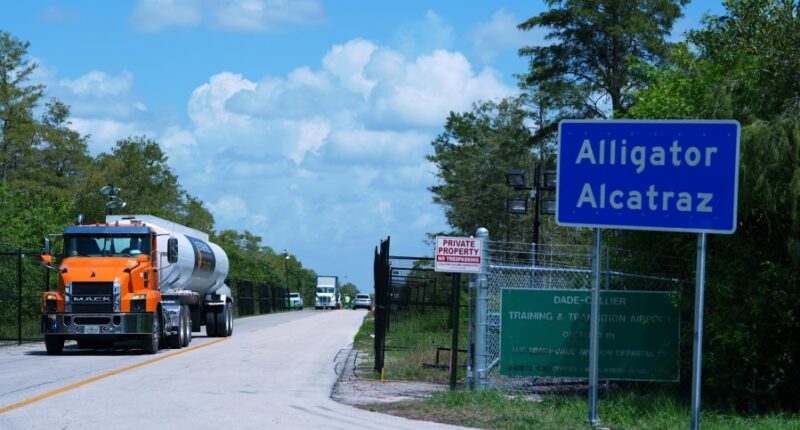Share this @internewscast.com

Attorneys representing detainees at an immigration detention center in the Florida Everglades are set for a court hearing on Thursday in Fort Myers. This is the first session following a federal judge’s order to wind down operations at the contentious site, known as “Alligator Alcatraz,” a name reminiscent of the infamous Californian island prison. The order came from a separate environmental lawsuit.
The court will focus on how the decision from the environmental case affects another lawsuit alleging that detainees have been unlawfully denied the ability to meet privately with their attorneys, infringing upon their First Amendment rights.
In the earlier environmental legal proceedings, U.S. District Judge Kathleen Williams had issued a preliminary injunction mandating the cessation of operations by the end of October. This included the relocation of detainees to other centers and removal of equipment and barriers.
The controversial detention site was established in a rush by Republican Governor Ron DeSantis’ administration in an isolated area of the Everglades as part of efforts to bolster President Donald Trump’s immigration enforcement policies. Its remote location was chosen to serve as a strong deterrent to prevent escapes.
The hearing also represents the case’s debut in Fort Myers, after being transferred from Miami. Last month, U.S. District Judge Rodolfo Ruiz determined that the claim regarding detainees being denied immigration court hearings was moot, since cases were moved to Miami’s Krome North Processing Center.
Judge Ruiz allowed the remaining legal issues regarding the detainees’ inability to have private communications with their attorneys to continue in Florida’s middle district, following a granted motion for a venue change by the state defendants. These issues include delays in scheduling meetings and challenges in having private phone or videoconference meetings with attorneys at the facility, officially known as the South Detention Facility.
Attorneys for the detainees argued in court papers filed Tuesday that the preliminary injunction in the environmental case has no impact on their case since the detention center continues to house detainees.
The state and federal governments have appealed Williams’ ruling, asking that it be put on hold. If their request for a stay is denied, and the facility eventually ceases operations, it could render the legal rights lawsuit moot, according to the federal government in court papers.
On the other hand, if the stay is granted and Williams’ order is put on hold, the state of Florida plans to resume accepting detainees at the facility, state officials said in court papers for the legal rights case.
As part of their appeal of the environmental case, state officials said that only four U.S. Immigration and Customs Enforcement agents at any given time are at the Florida-run detention center. The Florida officials said in court papers that the ICE agents “do not control the site.”
The question of who controls the facility is at the heart of the state and federal government’s appeal of Williams’ ruling. Her decision was issued in response to a lawsuit brought by Friends of the Everglades, the Center for Biological Diversity and the Miccosukee Tribe, who accused the state and federal defendants of not following federal law requiring an environmental review for the detention center in the middle of sensitive wetlands.
The federal government claims that it isn’t responsible for the detention center since it hasn’t spent a cent to build or operate the facility, even though Florida is seeking some federal grant money to fund a portion of it. Florida claims that the environmental impact statement required by federal law doesn’t apply to states.
___
Follow Mike Schneider on the social platform Bluesky: @mikeysid.bsky.social

















